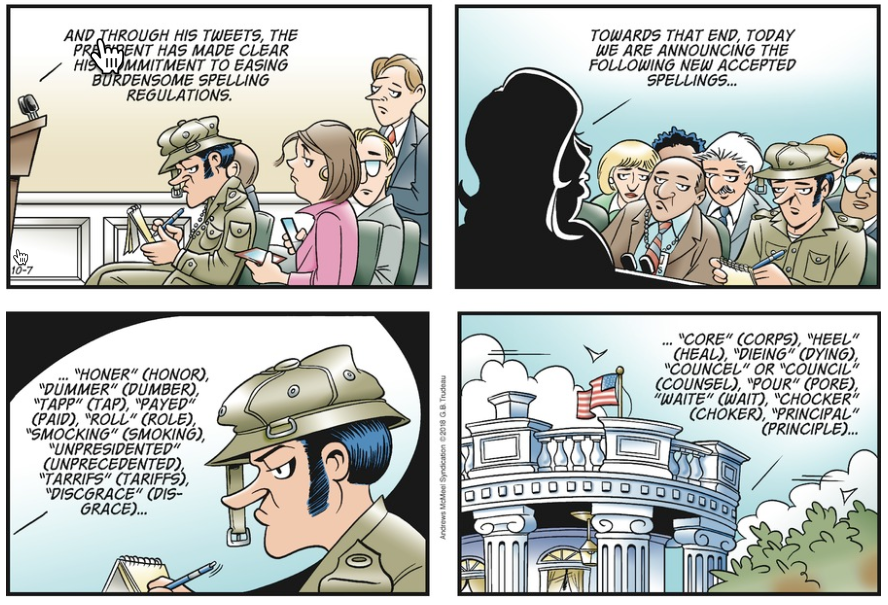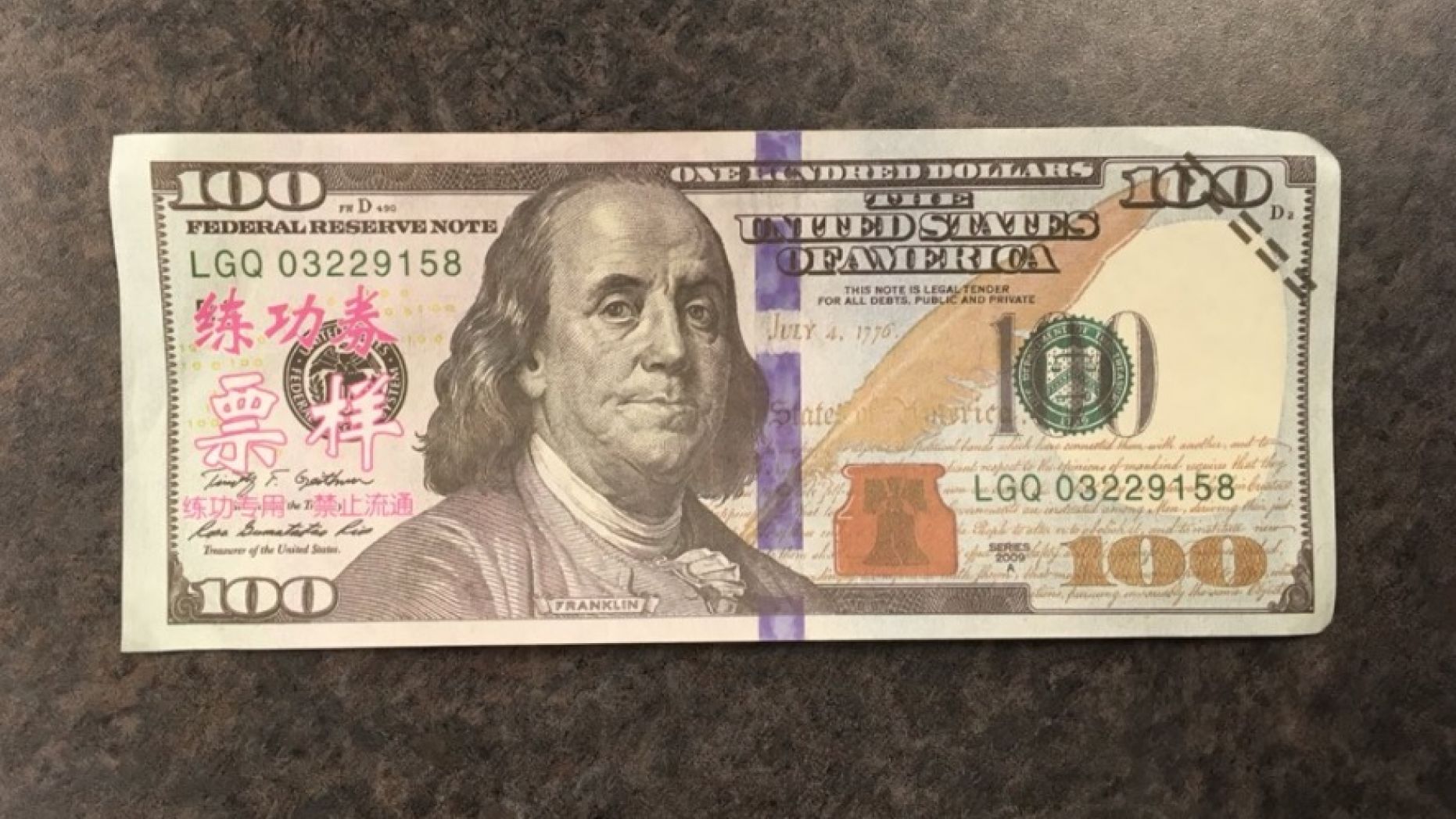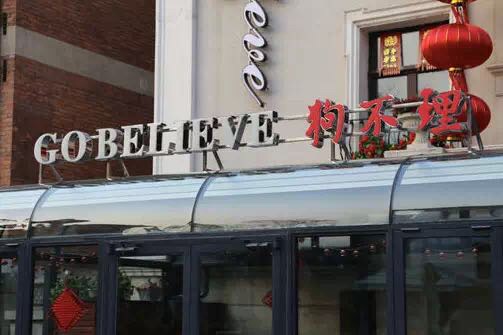Dangerous entrance
Photo taken by Ori Tavor in Beijing at the Bank of China next to Hepingmen subway station:
Read the rest of this entry »
Spacing within words
Speaking of spaces between syllables (but, as in this case, not all syllables), as we have been in recent posts, this photograph of a sign in China was sent in by Paul Midler:
But the lettering is very nice!
X & X
Perhaps modeled on the rise of big brands like Abercrombie & Fitch, Crate & Barrel, etc. (though in our own history going back much further), but a bit different, in Asia, we have Nail & Nail, Lock & Lock, Bagel & Bagel, and so forth. Below are photographs of two shops in Asia with "X & X" names.
I should mention that the Chinese name of the first one is "rèlà shēnghuó 热辣生活" ("hot and spicy life").
Read the rest of this entry »
Word, syllable, morpheme, phoneme
What is the basic unit of discursive, communicative language — word, syllable, morpheme, or phoneme?
This topic came up in the comments to the following posts:
"The concept of word in Sinitic" (10/3/18)
"Words in Vietnamese" (10/2/18)
"Diacriticless Vietnamese on a sign in San Francisco" (9/30/18)
"Words in Mandarin: twin kle twin kle lit tle star" (8/14/12)
Read the rest of this entry »
Style shifting in student writing assignments
Along with Valerie Ross, Brighid Kelly, and Helen Jeoung from Penn's Critical Writing program, I've been looking at material from student writing assignments (as part of an NSF-funded study*). One of the many topics of interest is the extent to which students, collectively and individually, succeed in shifting their writing style to suit different genres and audiences. As a first trivial exploration of this question, I took a quick look at some simple properties of overall word choice, comparing submissions to two different types of assignment. One of these assignments is a "Public Argument", which I believe is something like a newspaper Op-Ed; the other is a "Literature Review", where the appropriate style is more academic.
This morning I'll look at some of the simplest results of two simple explorations of properties that should be related to style shifting — the choice of words, and the length of the words chosen.
Read the rest of this entry »
Not for circulation
On Wednesday, a woman tried to purchase a $5,000 prepaid Visa card at a Safeway store in Washington with 49 of these hundred-dollar bills:
Source: "Woman tried to pass off fake $100 bills with pink Chinese lettering written on them: police", by Greg Norman, Fox News (10/4/18).
It's easy to spot how this $100 bill is fake.
Read the rest of this entry »
"Go Ralph Club!"
Below I've reprinted a prominent intellectual's Facebook post. The recent upsurge of interest in 1980s-era American slang gives it some relevance to LLOG, but mostly I just admired the sentiment. Since it was not a public post, I asked permission to quote it, and the author responded:
Go ahead. It was briefly a tough decision – I sat there cynically thinking "but I have a reputation". Then I thought, you know what, that's the problem. We don't let people be human, so they lie and cheat and pretend they're angels instead. So yes, go ahead.
Read the rest of this entry »
The concept of word in Sinitic
In the following posts, we've been tackling the thorny, multifaceted question of whether Vietnamese has words and lexemes, as opposed to having syllables and morphemes:
- "Diacriticless Vietnamese on a sign in San Francisco" (9/30/18)
- "Words in Vietnamese" (10/2/18)
During the course of our discussions, the parallel question of whether Sinitic had words or not also came up. Let me put it this way: although there was no concept of "word" in Sinitic before the 20th century, there were Sinitic words, going all the way back to the oracle bone inscriptions (the first stage of Chinese writing) more than three thousand years ago, as documented in these posts and dozens of others:
- "Polysyllabic characters in Chinese writing" (8/2/11)
- "Words in Mandarin: twin kle twin kle lit tle star" (8/14/12)
- "Polysyllabic characters revisited " (6/18/15)
- "A new polysyllabic character" (4/3/16)
- "Yet another polysyllabic Chinese character" (10/31/16)
Read the rest of this entry »
The Nth Noun
Yesterday while stuck in traffic I listened to Michael Lewis being interviewed about his new book "The Fifth Risk", and I passed the time thinking about other titles of the form Definite Article + Ordinal Number + Noun. There are many of these, but there are clear stand-outs for numbers 1, 2, 3, and 7:
The First Circle
The Second Sex
The Third Man
The Seventh Seal
I couldn't think of any iconic examples for 4, 5, 6, 8, 9, 10, 11, etc., but no doubt readers will be able to supply some.
Read the rest of this entry »







